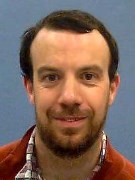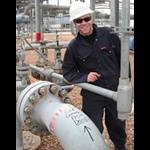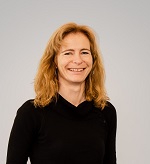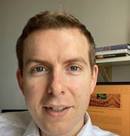 At the forefront of energy geoscience...
At the forefront of energy geoscience...
Chair
Mark Ireland

Dr Mark Ireland is currently a Senior Lecturer in Energy Geoscience at Newcastle University. Since 2023, he has also been academic Group Lead for Earth, Ocean, and Planetary Sciences. He is a geologist by training, with a PhD in geology from Durham University and an MESci in Exploration and Resource Geology from Cardiff University.
Mark started his career in the upstream oil and gas sector with bp, spending eight years in technical roles across the upstream part of the business. He now works on the decarbonisation of energy systems, specifically the role of geosciences in low carbon energy systems and the use and application of seismic reflection data to understand geological processes. He has led geoscience projects across academia and industry and is currently involved in a diverse range of applied research projects, spanning geothermal energy, energy storage, and carbon capture storage. His research includes collaborations with local and regional stakeholders and industry partners across the energy sector.
Treasurer
Ivan Fabuel-Perez

Ivan is a petroleum geologist with more than 10 years of experience in the oil and gas industry with ExxonMobil. He has a BSc in Geology from the University of Zaragoza (Spain), a MsC in Petroleum Geoscience from the University of Manchester and a PhD in stratigraphy and geological modelling from the University of Manchester. Ivan has worked in various roles within the upstream, including several exploration projects in different basins in Europe and Africa, production assets in the United States and stratigraphy research projects.
Since 2017, he has been working as the Technical Team Lead for the Cyprus Exploration Licences and the Easter Mediterranean, working within a multifunctional team of geoscientists, drillers and operation geologists. He has been a Fellow of the Geological Society since 2011, and he is also currently an Industry Representative for the British Sedimentological Research Group (BSRG).
Vice-Treasurer
Lin Ma

Lin is a lecturer focusing on multi-scale imaging and characterisation of rocks (Digital rocks) in geoenergy reservoirs and subsurface energy storage. She is also the theme lead of subsurface energy and storage at University of Manchester at Harwell and the Academic lead/co-chair of Women@manchester staff network at the university.
Lin's current research aims to build novel and advanced 3D/4D digital approaches and correlative experiments to fully understand the complicated pore networks and the reactions of subsurface energy (e.g. natural gas, geothermal, hydrogen and CO2) with rocks under subsurface conditions (e.g. temperature, pressure, and chemistry) cross multiple scales (nm to cm). Machine learning tools and image-based modeling are applied for enhanced understanding of these topics. Lin's research aims to achieve the goal of enabling economic growth and environment protection via applications of clean energy extraction and subsurface energy storage.
Publications Officer
Robert Wilson

Over the past decade, Robert has co-convened a number of conferences/sessions (including Industrial Structural Geology, 2012 & Fault Seal Analysis, 2018, both in collaboration with the Petroleum Group), and hopes to continue this active participation in the coming years through collaboration with other experts in the Energy Group.
Robert holds a PhD (Structural Geology) from Durham University, and an MSc (Geochemisty) and BSc (Geological) from Leeds. He has been a Fellow of the Geological Society for 20 years and was the Tectonic Studies Group Industry rep. from 2010 to 2012.
Communications Officer
Munira Raji

Dr Munira Raji is a Sustainable Geoscience Research Fellow at the University of Plymouth. She also holds visiting researcher positions at the University of Portsmouth and Hull, and a Science Policy Fellowship with the American Geophysical Union (AGU).
Munira has a PhD in Geological Sciences from Durham University, a BSc in Geology from the University of Portsmouth, an MSc in Petroleum Geosciences from the University of Derby, and a Certificate in Science Diplomacy from the Institut Barcelona d'Estudis Internacionals. Her areas of research expertise revolve around sustainable geoscience, sustainable energy, geoscience diplomacy and the SDGs.
Munira's research is focused on identifying and developing strategies to accelerate the shift from traditional, non-renewable sources of energy to more sustainable energy sources in order to meet net zero by 2035. Munira is also interested in the geopolitical implications of the global energy transition and the resulting shift in the balance of power between nations. Her research also focuses on energy diplomacy and how it can promote sustainable energy while managing the impact of the energy transition on international relationships and trade. Munira was awarded the Early Career Energy Geoscientist Medal from the Geological Society of London Energy Group in October 2022.
Student Representative
Rifky Wijanarko

Rifky is a subsurface geoscientist with an MSci from Imperial College London. Since 2021, he has been working as a PhD student at University of Aberdeen as part of the GeoNetZero CDT, looking at subsurface low carbon energy opportunities in NE England and the Southern North Sea. Previously he has worked on projects in offshore Gabon and Qatar with Perenco and TotalEnergies respectively. Rifky's research interests mainly lie in the application of geoscience in decarbonising the energy sector, using technologies such as CCUS and geothermal. He also has an avid interest in the integration of data science techniques to subsurface workflows, being proficient in both Python and C++.
Outside of research, Rifky was a mentor as part of the EQUATOR network, a NERC funded initiative that aims to increase retention of black, Asian, and minority ethnic (BAME) students in environmental research. Rifky has been a Fellow of the Geological Society of London since 2022.
Other members
Tiago Alves

Tiago Alves has a BSc in Engineering Geology (five years) from NOVA University in Lisbon (Portugal) and a PhD from the University of Manchester, UK (2002). He leads the 3D Seismic Laboratory, Cardiff University, since 2013. He is a Marine and Petroleum Geologist, and also a Lifetime Member of the Society of Exploration Geophysicists (SEG), having gathered extensive field and offshore experience throughout his career.
Now a Professor at Cardiff University, Tiago is particularly interested in sustainable ways of producing geoenergy, and has worked on projects tackling carbon sequestration, hydrogen and geothermal solutions. Environmental aspects of coastal and marine areas, tectonic processes on continental margins, structural geology, and the de-risking of petroleum/geoenergy E&P prospects, are key themes of his research. He has thus far published more than 200 papers and was previously part of Geological Society's Awards Committee in the mid-2010s. He is also ranked as the most prolific author in the world, from 2001 to 2020, on the subject of submarine landslides and related geohazards.
Nick Lee

Nick is a geologist by training, and a Fellow of the Geological Society. He holds a Ph.D. and M.S.c in geology. Following his academic studies, he joined the oil and gas industry starting his career as geologist for Anadarko Petroleum Corporation and latterly working for BG Group, Shell and as an independent consultant to various privately held energy companies. Most recently he joined PGS, where he holds the position of Subsurface Manager within PGS' New Energy group.
Nick has worked on a wide range of exploration and production projects globally across a diverse variety of geological settings. He now focuses on the application of geoscience to energy transition problems, and has a particular interest in how the energy industry can accelerate the identification and maturation of more sites for large-scale CO2 storage.
Helen Doran

Helen is an active member of the Geological Society, organising and chairing a workshop on heat flow and subsidence in 2018, editing a forthcoming GSLSpecPub2021-109 on the fundamentals of strike-slip and transform margins and recently chairing the Basin Modelling conference. In addition, she has presented at several past Geological Society events, including the Evening Lecture.
Helen has a background in geochemistry, heat flow, reservoir diagenesis, seal capacity assessment and pressure prediction. She obtained a 1st class degree in Geology from the Queens University of Belfast and a PhD in reservoir quality and diagenesis at the University of Edinburgh. She has over 20 years' global experience performing 'Petroleum Systems' evaluations in more than 100 sedimentary basins and has held technical leadership roles in BP, Ophir Energy, Ola Geoscience and Causeway GT. She is the co-author of several publications, including her latest book; "Strike-slip terrains and transform margins; structural architecture, thermal regimes and fluid systems" (in press).
Stuart Gilfillan

Stuart Gilfillan is currently a Reader in Geochemistry in the School of GeoSciences at The University of Edinburgh. He has over 16 years of post-PhD experience of innovative geochemical research in fluid tracing for GeoEnergy applications, mainly related to CO2 storage. More recently, he has applied his expertise to the emerging GeoEnergy sector through novel monitoring of unconventional gas extraction, geothermal energy, CO2 contamination in, and connectivity of, hydrocarbon fields.
Stuart has a keen interest in all areas of utilising the subsurface for energy production or storage and is currently Deputy Programme Director for the GeoEnergy MSc course, which he co-developed. He has been a Fellow of the Geological Society since 2003 and is currently a member of the UK Carbon Storage Research Facility Science Advisory Group.
Christopher Lloyd

Chris is a Senior Geophysicist at Equinor, with several years' experience working on the North Sea. He has a PhD from the University of Manchester on CO2 storage exploration, where he performed regional aquifer screening, site characterisation and CO2 injection modelling.
Chris moved to Norway in 2020, initially working for Lundin Energy (now part of AkerBP) in Oslo prior to joining Equinor in Bergen. His interests include CO2 storage site appraisal/monitoring, hydrocarbon exploration/production, offshore wind development and how geoscience can contribute to this energy mix in delivering sustainable, clean energy globally. His goal in the Energy Group is to help increase its visibility and provide insight into the broad range of careers in the energy industry available for geoscience students.
Eleanor Rollett

Eleanor is a chartered geoscientist with over 30 years' experience in the energy industry, following graduation from the University of Glasgow in 1990. Over that period, she has worked internationally for BP and Shell in a broad range of projects though the oil and gas exploration and development lifecycle.
Eleanor is currently working as a principal geoscience advisor, project manager and line manager within RPS Energy where she provides consultancy services, primarily for the oil and gas industry, and more recently for energy transition. She has an active interest in the repurposing of oil and gas geoscience skills to meet transition targets.
Within the Geological Society, Eleanor also acts as a scrutineer of Chartership Applications.
Michele Martins

Michele is a geophysicist with more than 18 years of experience in the O&G and Renewables industry. She has a BSc in Geophysics from the University of Sao Paulo, Brazil. She started her career working offshore doing 3D seismic data acquisition in the Gulf of Mexico and South America. She then spent few years in seismic processing before moving into exploration and data interpretation, where she worked in a variety of geological settings and basins.
Since 2019, Michele has been a geophysical consultant for the Renewable sector, working with ground models and integration of geological, geophysical and geotechnical data for Offshore Wind Farms in the UK, Europe and Asia. She now works for Global Maritime as a Geophysical Lead.
Ehsan Daneshvar

Dr Ehsan Daneshvar is a results-driven professional with over 20 years of diverse experience in Geology and Geosciences, including Energy Transition, Environmental Monitoring, Oil & Gas, Water Resource Management, Mining, and Offshore Engineering sectors. He currently serves as the Chief Operating Officer and Principal Geoscientist at Future Geoscience. Ehsan holds a PhD in Mineralogy and Petroleum Geosciences from the University of Liverpool, along with an MSc in Groundwater Modeling and Hydrogeology, and a BSc in Geology. Additionally, he completed a two-year post-doctoral fellowship focusing on AI in Carbonate reservoirs and enhanced Oil recovery.
Throughout his career, Ehsan has demonstrated expertise in various roles such as Operation Manager, Leadership, Lecturing in Universities, Project Geoscientist, Senior Mineralogist, Project Coordinator, and Business Development Specialist. His research interests encompass soil-water relationships, advanced reservoir quality assessments in clastics and carbonates, sustainable energy demands, and environmental justice.
Ehsan's industrial activities are primarily centred on identifying and developing strategies to address geological complexities in basins (exploration and developments) across North Europe, Southeast Asia, and the Gulf of Mexico, through innovative approaches and integrated workflows. He has successfully organised workshops for three years focusing on Triassic stratigraphy and reservoir quality in North Europe. Furthermore, Dr. Daneshvar collaborates with international NGOs and the UN to raise public awareness regarding environmental justice and water depletion's impacts on societies in arid and semi-arid zones in the Middle East and North Africa.
Additionally, Ehsan is on the editorial board of a national daily newspaper, focusing on Energy Security, global warming implications on Energy, geopolitical relationships, and Environmental impacts.
Finally, Ehsan is a an official FAW football referee.
James Todd

James is an engineering geologist with over 15 years' experience working on energy related projects. James' work has taken him around the globe from offshore wind in Norway, hydropower in Romania, Oil and Gas in Azerbaijan and Carbon Capture Utilisation and Storage (CCUS) and Hydrogen projects in the UK, with roles 'varying from policy development through to design and construction.
James is passionate about promoting the role geoscience has to play in the energy transition and ensuring our contribution is recognised across this industry. As a Technical Director in AECOM, James' current focus is working across the energy, environment and sustainability business, to develop our geoscience offering in key energy sub-markets such as Future Fuels, Renewables and Industrial Decarbonisation, and supporting our transition to net zero.
Holly-Marie Owen

Holly graduated from Durham University in 2011 with an MSci in Geoscience. She has over a decade of experience as a Geoscientist at ERCE, a leading consultancy. The dynamic nature of consultancy work has allowed her to immerse herself in diverse geological settings across the globe. Holly's experiences span various reservoir types and data, providing her with a unique perspective on the complexities of geoscience and the energy sector.
Whilst Holly began her career working in the oil and gas industry, her adaptability and commitment to sustainable energy solutions have led her to engage in more contemporary projects involving Carbon Capture and Storage (CCS), geothermal energy, hydrogen and helium exploration. Her current role as a Future of Energy Lead at ERCE underscores her dedication to advancing sustainable energy practices.
Holly has been an active participant in the wider energy community for many years. Her involvement as a GESGB Council Member, representing industry Young Professionals, highlights her commitment to nurturing the next generation of energy experts. Additionally, Holly has contributed her insights and expertise to two Horizon 2020 research consortiums, ShalexEnvironment and Science4CleanEnergy, serving on their advisory boards.
Holly is committed to the advancement of cleaner and more efficient energy systems. She has a deep understanding of the complex challenges facing the energy sector and an unwavering commitment to finding innovative solutions. She looks forward to assisting the Energy Group in advancing our community towards a sustainable energy future.
Robert Wilson

Over the past decade, Robert has co-convened a number of conferences/sessions (including Industrial Structural Geology, 2012 & Fault Seal Analysis, 2018, both in collaboration with the Petroleum Group), and hopes to continue this active participation in the coming years through collaboration with other experts in the Energy Group.
Robert holds a PhD (Structural Geology) from Durham University, and an MSc (Geochemisty) and BSc (Geological) from Leeds. He has been a Fellow of the Geological Society for 20 years and was the Tectonic Studies Group Industry rep. from 2010 to 2012.
Mark Wood

Mark is a Geoscientist with 15 years' industry experience. Since joining Shell in 2009, he has been involved with field operations in Oman and the UK, and conventional hydrocarbon project maturation in the UK and Nigeria. He is currently a senior geologist and subsurface lead in Shell's CCS Capability and Assurance Team and has worked on a number of CCS projects around the North Sea.
Currently, Mark leads the subsurface and wells teams who are maturing CCS opportunities in Malaysia. He has an undergraduate degree in Geology from the University of Aberdeen, and a Masters degree in Petroleum Geoscience from Imperial College London.